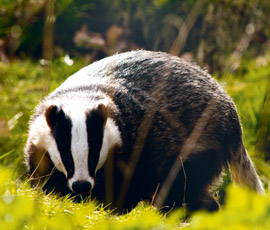Spelman confirms two badger cull pilots

DEFRA has announced a controlled cull of badgers to tackle the spread of bovine tuberculosis in cattle.
The cull is expected to be piloted initially in two areas from early autumn next year, DEFRA secretary Caroline Spelman told the House of Commons on Wednesday 14 December.
The two pilots, carried out over a period of six weeks, will be closely managed and monitored to examine how safe, effective and humane controlled shooting is as a method of culling.
“We are clear these pilots must be carried out in accordance with strict licensing conditions so that they are effective, safe and humane. Natural England will carefully consider two licence applications, pre-selected by DEFRA, and will assess them against a new set of criteria,” she said.
An independent panel of experts will be asked to oversee and evaluate the pilots and report to ministers, before a decision is made on whether to roll out the policy more widely.
Scientists agree that if culling is conducted in line with the Randomised Badger Culling Trial (RBCT), we would expect it to reduce TB in cattle over a 150 square kilometre area, plus a 2 km surrounding ring, by an average of 16% over nine years when compared to similar unculled areas, Mrs Spelman said.
Farmers will have to take reasonable measures to identify barriers and buffers, such as rivers, coastlines and motorways, or areas where there are no cattle or where vaccination of badgers occurs, at the edge of culling areas to minimise the ‘perturbation effect’, where disturbing the badger population is thought to cause an increase in TB in cattle in the surrounding area.
Up to £250,000 a year will be made available over the next three years to support and encourage badger vaccination. The Government has already spent £35 million on developing badger and cattle vaccines since 1994 and plan to spend another £20m on the development of practical and usable vaccines over the next five years, she said.
Mrs Spelman added:
“Bovine TB is a chronic and insidious disease which is having a devastating impact on farmers and rural communities. Unless further action is taken now it will continue to get worse.
“There is great strength of feeling on this issue and no-one wants to see badgers culled. But no country in the world where wildlife carries TB has successfully controlled the disease in cattle without tackling its presence in wildlife as well.
“We already have a robust set of cattle controls in place, and we plan to strengthen them further, but the scientific evidence shows that unless we tackle bovine TB in badgers we will never eradicate it in cattle.
“Ultimately we want to be able to vaccinate both cattle and badgers and plan to invest a further £20 million over the next five years on the development of usable badger and cattle vaccines. However these are still years away, and we cannot say with any certainty if, or when, they will be ready,” the minister said.
The package of measures already in place to control and eradicate bovine TB includes:
• Routine testing and surveillance of all cattle based on risk. We have already significantly expanded the areas on more frequent testing;
• Pre-movement testing of cattle from high risk areas;
• Movement restrictions on animals from herds that have or are suspected of having bovine TB;
• The slaughter of all animals that have tested positive for bovine TB;
• DNA tagging of cattle that have proved positive, before they are slaughtered, to prevent fraud;
• Advice and support for farmers that have had cases of bovine TB in their herds on biosecurity and reducing the risk of bovine TB; and
• Research into how bovine TB is spread, and the continuing development of oral badger and cattle vaccines.
For more background on the badger cull and bovine TB go to our dedicated area
Join the conversation about reaction to this announcement on our badger cull forum
